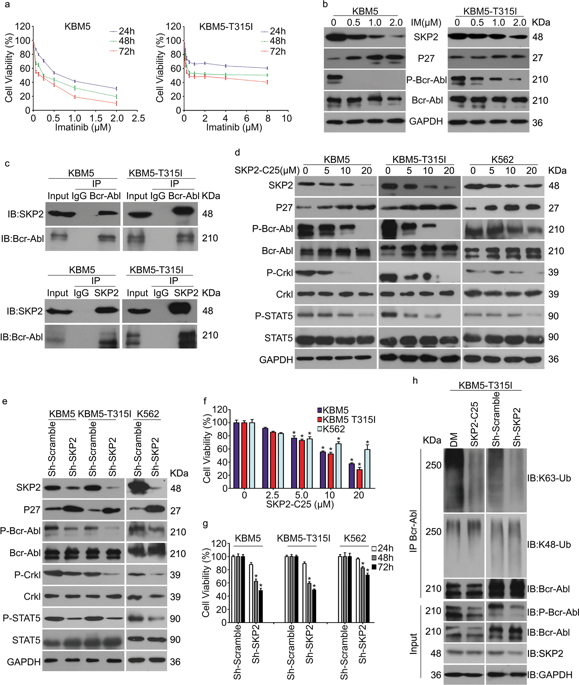Cell Discovery ( IF 13.0 ) Pub Date : 2019-04-30 , DOI: 10.1038/s41421-019-0092-z Yuning Liao , Ningning Liu , Xiaohong Xia , Zhiqiang Guo , Yanling Li , Lili Jiang , Ruiqing Zhou , Daolin Tang , Hongbiao Huang , Jinbao Liu

|
Constitutive activation of tyrosine kinase Bcr-Abl is the leading cause of the development and progression of chronic myeloid leukemia (CML). Currently, the application of tyrosine kinase inhibitors (TKIs) targeting the Bcr-Abl is the primary therapy for CML patients. However, acquired resistance to TKIs that develops overtime in the long-term administration renders TKIs ineffective to patients with advanced CML. Therefore, increasing studies focus on the amplified expression or activation of Bcr-Abl which is proposed to contribute to the advanced phase. Here, we show that S-phase kinase-associated protein 2 (SKP2) acts as a co-regulator of Bcr-Abl by mediating its K63-linked ubiquitination and activation. Further investigations show that USP10 as a novel deubiquitinase of SKP2 amplifies the activation of Bcr-Abl via mediating deubiquitination and stabilization of SKP2 in CML cells. Moreover, inhibition of USP10 significantly suppresses the proliferation of both imatinib-sensitive and imatinib-resistant CML cells, which likely depends on SKP2 status. This findings are confirmed in primary CML cells because these cells are over-expressed with USP10 and SKP2 and are sensitive to a USP10 inhibitor. Taken together, the present study not only provides a novel insight into the amplified activation of Bcr-Abl in CML, but also demonstrates that targeting the USP10/SKP2/Bcr-Abl axis is a potential strategy to overcome imatinib resistance in CML patients.
中文翻译:

USP10通过稳定慢性粒细胞白血病中的SKP2来调节SKP2 / Bcr-Abl轴
酪氨酸激酶Bcr-Abl的组成性激活是慢性粒细胞白血病(CML)发生和发展的主要原因。目前,针对Bcr-Abl的酪氨酸激酶抑制剂(TKI)的应用是CML患者的主要治疗方法。但是,长期服用后随着时间的推移会产生对TKI的耐药性,因此TKI对晚期CML患者无效。因此,越来越多的研究集中在Bcr-Abl的扩增表达或激活上,这被认为有助于晚期阶段。在这里,我们显示S期激酶相关蛋白2(SKP2)通过介导其K63连接的泛素化和激活,作为Bcr-Abl的共调节子。进一步的研究表明,USP10作为一种新型的SKP2去泛素酶,可通过介导CML细胞中SKP2的去泛素化和稳定作用来放大Bcr-Abl的激活。此外,抑制USP10会显着抑制伊马替尼敏感和伊马替尼耐药的CML细胞的增殖,这可能取决于SKP2的状态。这一发现在原代CML细胞中得到了证实,因为这些细胞在USP10和SKP2中过表达,并且对USP10抑制剂敏感。综上所述,本研究不仅提供了对CML中Bcr-Abl扩增激活的新颖见解,而且还证明了靶向USP10 / SKP2 / Bcr-Abl轴是克服CML患者伊马替尼耐药性的潜在策略。抑制USP10会显着抑制伊马替尼敏感和伊马替尼耐药的CML细胞的增殖,这可能取决于SKP2的状态。这一发现在原代CML细胞中得到了证实,因为这些细胞在USP10和SKP2中过表达,并且对USP10抑制剂敏感。综上所述,本研究不仅提供了对CML中Bcr-Abl扩增激活的新颖见解,而且还证明了靶向USP10 / SKP2 / Bcr-Abl轴是克服CML患者伊马替尼耐药性的潜在策略。抑制USP10会显着抑制伊马替尼敏感和伊马替尼耐药的CML细胞的增殖,这可能取决于SKP2的状态。这一发现在原代CML细胞中得到了证实,因为这些细胞在USP10和SKP2中过表达,并且对USP10抑制剂敏感。综上所述,本研究不仅提供了对CML中Bcr-Abl扩增激活的新颖见解,而且还证明了靶向USP10 / SKP2 / Bcr-Abl轴是克服CML患者伊马替尼耐药性的潜在策略。











































 京公网安备 11010802027423号
京公网安备 11010802027423号